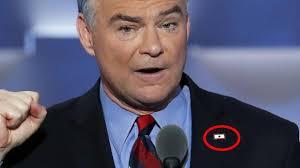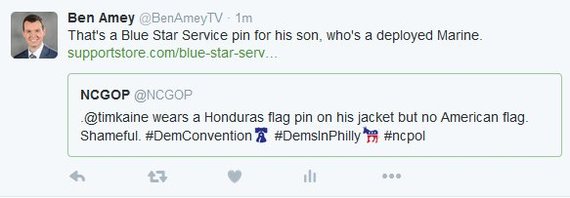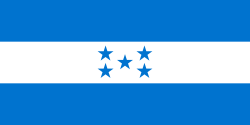It was a but a blip in the raucous carnival that the Presidential campaign has been, a flash-in-the-pan moment instantly overshadowed by more headline grabbing events. But the quickly forgotten fuss last week about what kind of lapel pin Democratic Vice Presidential nominee Senator Tim Kaine was wearing as he accepted his nomination at the Democratic convention might be one of the most instructive episodes in a campaign that has a lot of smart observers struggling to explain why we seem suddenly to be in a "post-factual" period of Presidential politics.
Kaine wore a Blue Star Families lapel pin to honor his son, 1st Lieutenant Nathaniel, a Marine officer deployed in Eastern Europe.
Someone in the North Carolina Republican Party mistook the pin for the Honduran flag, and even as Kaine was still on the podium, @NCGOP tweeted "@TimKaine wears a Honduras flag pin on his jacket but no American flag. Shameful."
In these days of instant fact-checking, reporter Ben Amey quickly tweeted that the accusation was wrong. Moments later @NCGOP quickly thanked him and took the tweet down, but not before Amey had wisely preserved it with a screen shot.
@NCGOP, likely an intern with itchy Twitter fingers, did not apologize, but 12 hours later his boss, Dallas Woodhouse, Executive Director of the North Carolina Republican Party, did, saying;
"We offer our sincere and unqualified apology for the mistake made on Twitter last night regarding Gov. Kaine's lapel pin. The tweet was wrong on the facts, wrong in tone and should not have happened."
The episode is already all but forgotten now that the conventions are over and the final battle has been engaged. But it deserves more reflection, because it reveals a lot about the psychology of how we really choose our parties and the candidates we support, and how frighteningly little reason has to do with those choices. In that context, the Lapel Pin Affair is an unsettling cautionary tale.
Imagine this young Republican at the keyboard watching the Democratic convention. Let's call him Stu (as in, made a Stu Pid Mistake.) Stu's assignment was to help flood the hashtag conversations #DemConvention and #DemsInPhilly with negative tweets. So that's the frame of mind Stu was in. Partisan, looking for anything he could fit into his Us against Them context. And that...the influence of 'frame of mind' on our ability to think carefully...is what is really scary about this, because Stu's frame of mind clearly mattered more than his intelligence and reason. Stu is not alone. He represents the same that's happening to millions of Americans. Intelligence and reason are being overshadowed by emotion and instinct, putting the nation in jeopardy as a result.
Think about Stu's mistake. Would it make any sense at all that Senator Kaine would be wearing a Honduras national flag pin? Nobody who gave the idea even a moment's thought would have made such a ridiculous mistake. But Stu apparently did not give things even a moment's thought. He didn't check what the Honduran flag looks like. He didn't look closely enough to see what Kaine's lapel pin actually looked like. He saw things through partisan eyes and did what we all do, all the time. He quickly, instinctively jumped to conclusions that fit what he already felt and believed. Conscious thought...reflection about the evidence to inform a more intelligent choice...never even occurred.
This is how human cognition always works. We rarely stop and consciously think about most things. More often, we quickly assess information and fit it into what we already know and how we already feel. We quickly and subconsciously filter the facts to fit our preferred narratives and values. We see things not as they are but the way we want to see them.
The brain prefers to do it this way. It's easier. It literally takes fewer calories than doing all the extra neural processing of "paying" attention, and our cognitive systems evolved back when we weren't sure when the next meal would come, so spending calories judiciously was important for survival. Calories may be readily available now, but this energy saving instinct is built into how the brain still operates. As satirist Ambrose Bierce wrote in the Devil's Dictionary, the brain is only "the organ with which we think we think."
Making things worse in an election season, we see things through the lens of our need to belong to a tribe, a group. Belonging to a group gives us more power than we have as individuals. Belonging to a group protects us from things we can't protect ourselves from as individuals. Belonging helps us feel safe.
So we adopt the views of our group...in this case, our political party...and espouse those views not because we've given matters any careful thought but because loyalty to the views of the group (as set forth by its leaders) rewards us with a sense of power, belonging, and protection. And the more worried we are and the more powerless we feel the more we behave this way, turning to our tribe to help us feel safe. Lord knows millions of Americans of all political persuasions are feeling worried and powerless these days.
Our instinctive need for safety and survival subconsciously drives this fact-bending way of seeing things. It's why we don't just see people with opposing views as people with whom we disagree. They're the enemy. They literally pose a threat. This is why we toe the party line, overlook the flaws and lies of our candidates, twist and contort reality to fit our group's view of climate change, immigration, affordable health care, gun control, and so many more issues. The importance of the protection of belonging explains how some Trump supporters can say "I know he lies, but at least he tells it like it is", without a hint of shame at the embarrassing non sequitur of such a remark. And it explains how Stu could see this
and think it was this
But it's not just Trump supporters, or Sanders supporters who say they'll vote for Trump because their tribe is so invested in hating Hillary. We are all Stu to some degree, instinctively more likely to jump to conclusions without pausing to think and more tribal than open-minded - especially when we feel powerless and scared. Elections magnify these potentially dangerous aspects of human cognition. It's why what's happening in America right now is doing damage that will last long after election day.
So thanks, Stu, for such an overtly dumb mistake. You've given us a great teaching moment. An understanding of your thoughtlessness might inspire us to spend a few more mental calories so we can be a little more thoughtful ourselves (which of course is another good way to try to stay safe) as we face a that Presidential election that has put the health and welfare of our society, and the United States itself, in serious jeopardy.




